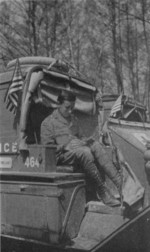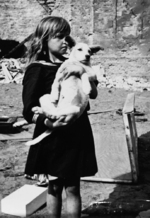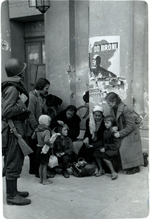Julien Bryan
| Surname | Bryan |
| Given Name | Julien |
| Born | 23 May 1899 |
| Died | 20 Oct 1974 |
| Country | United States |
| Category | Photography |
| Gender | Male |
Contributor: C. Peter Chen
ww2dbaseJulien Hequembourg Bryan was born in Titusville, Pennsylvania, United States in 1899. In 1916, he volunteered with the American Field Service for the French Army, driving an ambulance in Verdun and the Argonne. Upon his return, he wrote the book Ambulance 464 about his experiences in WW1; the book was illustrated with photographs that he had taken. In 1921, he graduated from Princeton University in New Jersey, United States. He then moved on to complete studies at the Union Theological Seminary, although he chose not to be ordained as a minister. He then spent some time as the director of a YMCA center in Brooklyn, New York, United States. Beginning in the late 1920s, he began traveling with great frequency, writing travelogues and taking photographs; among the countries he had visited included China, Georgia, Russia, Poland, Germany, Switzerland, and the Netherlands. His trip to Germany in 1937 resulted in a rich visual archive of daily life under the Nazi regime, both for non-Jews and Jews. When the European War began with the German invasion of Poland in Sep 1939, he found himself to be in Poland by chance. He arrived in Warsaw, Poland on 7 Sep 1939 and was able to secure an automobile from Mayor Stefan Starzynski. With the aid of interpreter Stefan Radlinski, he took hundreds of photographs and used 5,000 feet of motion picture film, documenting the German air attacks on the city. He recalled an incident at a potato field; one of the photographs he had taken at this field would become an iconic image of the campaign for Poland.
ww2dbaseAs Bryan exited Eruope via the German city of Königsberg, he hid his film within various objects to avoid confiscation. Returning to the United States, a number of his photographs from Warsaw were published. 15 were seen in the 23 Oct 1939 issue of Life magazine, and 26 were seen in the 5 Dec 1939 issue of Look Magazine. In 1940, he produced a short documentary, "Siege", on the attacks on Warsaw, released by RKO Radio Pictures; he would later write a book by the same title. During the war, he would be employed by the Coordinator of Inter-American Affairs and the State Department to make educational films. After WW2, he founded the International Film Foundation in 1945, which was devoted to the creation of documentary films for the school market. He returned to Poland in 1946 and again in 1958. During the 1958 trip, he published hundreds of his 1939 photographs, and through this effort he met with some of the people he had filmed almost 20 years prior. In Aug 1974, he was awarded the Merit for Polish Culture medal by the Polish government. He passed away in Oct 1974. In 2003, his son Sam Bryan donated his war time photographs and motion pictures to the United States Holocaust Memorial Museum.
ww2dbaseSource: Wikipedia
Last Major Revision: Nov 2018
Julien Bryan Interactive Map
Photographs
 |  |
Photographs Taken by Julien Bryan
 |  |
Julien Bryan Timeline
| 23 May 1899 | Julien Bryan was born in Titusville, Pennsylvania, United States. |
| 7 Sep 1939 | Julien Bryan arrived in Warsaw, Poland. |
| 21 Sep 1939 | Julien Bryan departed Warsaw, Poland. |
| 23 Oct 1939 | Life Magazine published 15 of war time photographs of Warsaw, Poland taken by Julien Bryan. |
| 5 Dec 1939 | Look Magazine published 26 of war time photographs of Warsaw, Poland taken by Julien Bryan. |
| 20 Oct 1974 | Julien Bryan passed away in the United States. |
Please consider supporting us on Patreon. Even $1 per month will go a long way! Thank you. Please help us spread the word: Stay updated with WW2DB: |

» Invasion of Poland
- » 1,182 biographies
- » 337 events
- » 45,119 timeline entries
- » 1,249 ships
- » 350 aircraft models
- » 207 vehicle models
- » 376 weapon models
- » 123 historical documents
- » 261 facilities
- » 470 book reviews
- » 28,415 photos
- » 365 maps
Winston Churchill